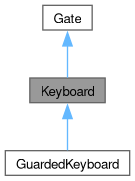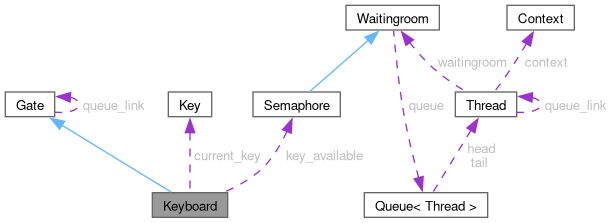
|
StuBS
|
Handles keystrokes. More...
#include <keyboard.h>


Public Member Functions | |
| Keyboard () | |
| Constructor. | |
| void | plugin () |
| Initialization of the keyboard. | |
| bool | prologue () override |
| Prologue of keyboard interrupts. | |
| void | epilogue () override |
| Epilogue of keyboard interrupts. | |
| Key | getKey () |
| Application interface to retrieve a Key. | |
 Public Member Functions inherited from Gate Public Member Functions inherited from Gate | |
| Gate () | |
| Constructor. | |
| virtual | ~Gate () |
| Destructor. | |
Private Attributes | |
| Key | current_key |
| Buffer (with length = 1) for pressed keys. | |
| Semaphore | key_available |
| Semaphore to signal an available key. | |
Handles keystrokes.
This class ensures correct initialization of the keyboard and, above all, its interrupt handling. It also allows an application to query it for key strokes.
|
overridevirtual |
| Key Keyboard::getKey | ( | ) |
Application interface to retrieve a Key.
This method returns the last pressed key (as an Key object). If no key has been pressed, the calling application thread is blocked until a key is available – this is achieved by using a Semaphore.
| void Keyboard::plugin | ( | ) |
Initialization of the keyboard.
Initialization of the keyboard and activation of the specific interrupt handling: The object will register itself at the Plugbox and configure the IOAPIC to receive the corresponding interrupts.
|
overridevirtual |
Prologue of keyboard interrupts.
This method directly handles interrupts caused by the keyboard. Since multiple interrupts are triggered on a keystroke (press & release) it produces not always a printable ASCII character – therefore only valid keys are handled in the Keyboard::epilogue.
Since the buffer is limited, it also ensures that a valid key is not overwritten by a subsequent prologue before it was handled in the Keyboard::epilogue.
true if a new Key was stored in the buffer and has to be processed in the Keyboard::epilogue. Implements Gate.